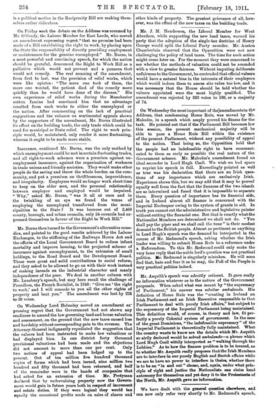On Friday week the debate on the Address was resumed
by Mr. O'Grady, the Labour Member for East Leeds, who moved an amendment expressing regret " that no promise had been made of a Bill establishing the right to work, by placing upon the State the responsibility of directly providing employment or maintenance for the genuine unemployed." Mr. Burns, in a most powerful and convincing speech, for which the nation should be grateful, denounced the Right to Work Bill as a palliative which would not prevent and a panacea that would not remedy. The real meaning of the amendment, from first to last, was the provision of relief works, which were like opiates : " The more one took of them, the more one wanted, the patient died of the remedy more quickly than he would have done of the disease." His own experience of relief works during the Manchester cotton famine had convinced him that no advantage resulted from such works to either the unemployed or the nation. After commenting on the lack of practical suggestions and the reliance on sentimental appeals shown by the supporters of the amendment, Mr. Burns illustrated its effect on the building trade, the only trade which could be used for municipal or State relief. The right to work prin- ciple would, he maintained, only render it more fluctuating, whereas it ought to be made more stable.






































 Previous page
Previous page